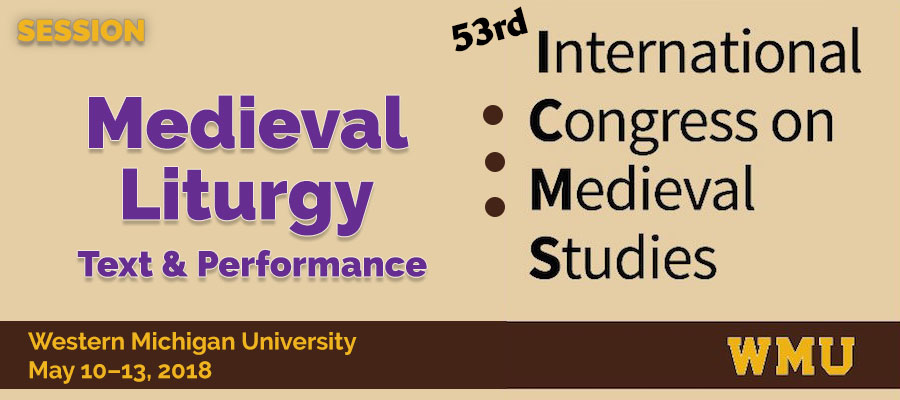Medieval Liturgy: Text and Performance, 53rd International Congress on Medieval Studies, Western Michigan University, May 10–13, 2018
The Interdisciplinary Graduate Medieval Colloquium at the University of Virginia invites graduate students, faculty, and independent scholars to submit papers for a session entitled "Medieval Liturgy: Text and Performance" at the 53nd International Congress on Medieval Studies (May 10-13, 2018) in Kalamazoo, Michigan (USA). A complete panel description can be found, below. Abstracts of up to 250 words for a 15-20-minute paper should be submitted on or before September 15, 2017 via Google Forms. All entries will undergo blinded peer review. Applicants will be notified of the committee's decisions via email by Friday, September 22.
Medieval Liturgy: Text and Performance
This panel turns on a rather simple (or simplistic) question: is liturgy a text or a performance? The howls of dissent rise up – Who would ask such a thing? The answer is both, of course! In response, this panel invites graduate students, affiliated faculty, and independent scholars to respond to the dichotomy of text/performance even as they replace it with their own set of questions to guide the future study of liturgy as text, music, and/or drama. Among other concerns, how are the textual and bodily experiences of liturgy coeval, or even co-constitutive, in the Middle Ages? In what ways do liturgical texts both organize and find their roots in ritual reenactments that involve procession, genuflection, and acts of proskynesis? What episodes and anecdotes from the Middle Ages reveal how liturgical text is entangled with the environment in which it is read, sung, translated, or performed?
The panel aims to create a conversation that goes beyond the traditional practice of liturgical exegesis to a more active, embodied study of the liturgy in Catholic, Orthodox, and Jewish traditions. Since unpacking the meaning of a somatic study of liturgy is the prime goal of the session, participants may use movement, travel, and the kineticism of objects as organizing principles for their work or ask how scholars actually perform or participate in the liturgies they study. Interesting avenues include discussions of the materiality of liturgy, from enduring forms to ephemera, via a close look at manuscripts, printed books, sacred instruments, vestments, relics, urban layouts, decorations for processions, and the architecture of churches, chapels, and tombs. We particularly invite work that pushes the boundary of what is currently considered the purview of “liturgy and ritual studies,” explores some aspect of space and sound, and pertains to the smell, touch, and taste of the liturgy in North Africa, Europe, Asia Minor, the Middle East, Russia, and the Byzantine world.
Session organizers
Justin Greenlee, University of Virginia
DeVan Ard, University of Virginia
